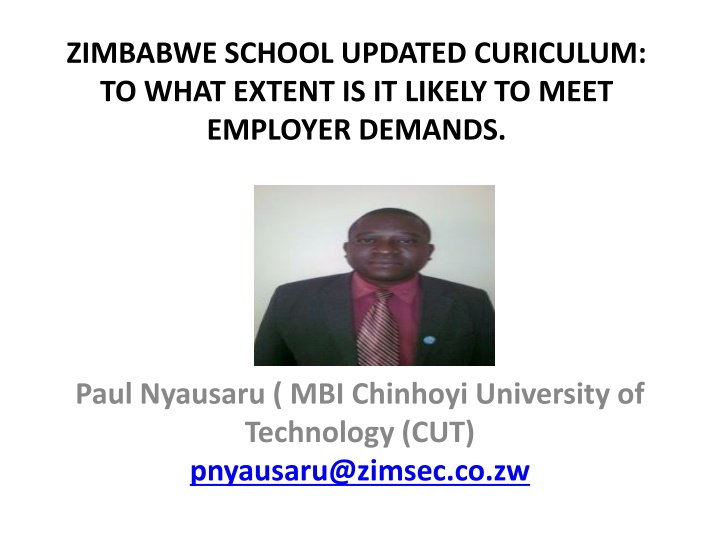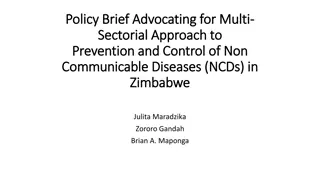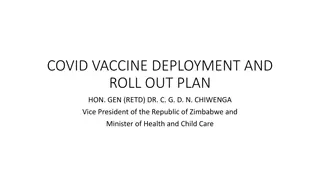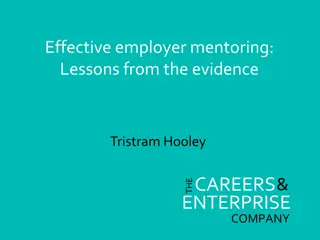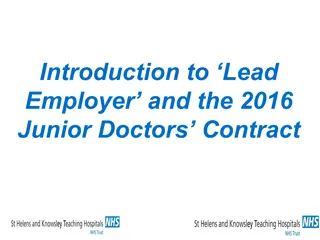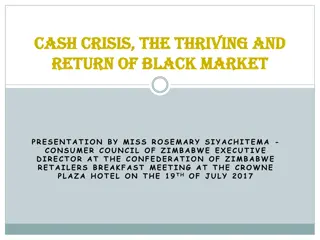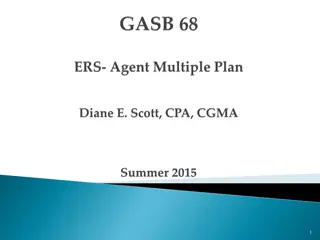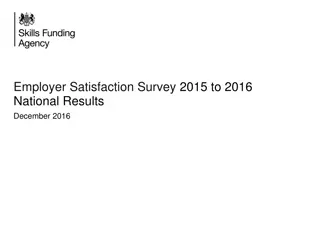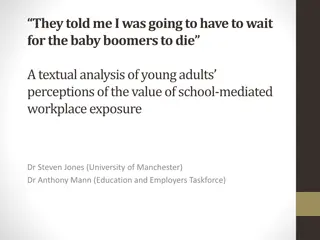Zimbabwe School Curriculum and Employer Demands
The study examines the Zimbabwe updated curriculum's alignment with employer demands, focusing on the importance of 21st-century skills and employability attributes for meeting the needs of the labor market. It explores the role of curriculum in fostering quality education and lifelong learning opportunities, essential for holistic development and workforce readiness.
Download Presentation

Please find below an Image/Link to download the presentation.
The content on the website is provided AS IS for your information and personal use only. It may not be sold, licensed, or shared on other websites without obtaining consent from the author.If you encounter any issues during the download, it is possible that the publisher has removed the file from their server.
You are allowed to download the files provided on this website for personal or commercial use, subject to the condition that they are used lawfully. All files are the property of their respective owners.
The content on the website is provided AS IS for your information and personal use only. It may not be sold, licensed, or shared on other websites without obtaining consent from the author.
E N D
Presentation Transcript
ZIMBABWE SCHOOL UPDATED CURICULUM: TO WHAT EXTENT IS IT LIKELY TO MEET EMPLOYER DEMANDS. Paul Nyausaru ( MBI Chinhoyi University of Technology (CUT) pnyausaru@zimsec.co.zw
PRESENTATION LAYOUT Background Problem Statement Research Questions Significance of the Study Scope of the Study Literature Review Methodology Results/Findings
Background of the Study Sustainable Development Goal (SDG4) has to do with education in the post-2015 development agenda. It aims to ensure inclusive and equitable quality education and promote lifelong learning opportunities for all . Realising the essential role of curriculum in enabling quality learning and in articulating and supporting education that is relevant to holistic development, it is critical to interrogate the current Zimbabwe updated curriculum in terms of the extent to which it is likely to meet employer demands.
Background of the Study Philip Stabback (2006), asserts that curriculum should be able to articulate both the competencies necessary for lifelong learning and the competencies needed for holistic development. He further argues that curriculum lies at the crossroads of these four key aspects of SDGs : that education should be (1) inclusive and equitable, (2) characterized by quality learning, (3) promoting lifelong learning, and (4) relevant to holistic development.
Background of the Study This then shows how important it is to consider how the current curriculum takes into account 21stcentury skills which are critical in the attainment of the aspects of SDGs and ultimately meeting the demand of the employers who are the consumers of the product.
Background of the Study The element of employability then comes into effect. Employability may thus be defined as a set of attributes, skills and knowledge that all labour market participants should possess to ensure they have the capability of being effective in the workplace to the benefit of themselves, their employer and the wider economy. (CBI, March 2009).
Background of the Study The questions that come to mind are: What should a curriculum that is relevant to industry provide for it to be effective? How can soft skills be accommodated in the curriculum in order to develop the right calibre of students required by industry? How can Industry play its role in influencing the teaching, learning and assessment of the curriculum? What strategies can be put in place to allow for continuous interaction between industry and the school system?
Background of the Study The objective of this paper is to interrogate how the updated curriculum is likely to produce a graduate who can easily fit into the world of work taking into account views from the employer. The paper sought to analyse the different views from people management practitioners in Zimbabwe and how these could be integrated into the updated curriculum that is being rolled out.
Problem Statement Today s business climate requires that recruits not only know the academic/technical aspects of their jobs, but also possess soft skills such as communication, critical thinking and leadership skills. Most school curricula, however, focus only on academic/technical skills, and do not address the soft skills in a formal setting or on a consistent basis. As graduates compete for fewer jobs on the market, education authorities must develop creative and innovative ways to give their graduates a competitive edge
Problem Statement Employers have always raised an issue on the standard of graduates that come into the world of work in terms of acquisition of the requisite soft skills. The updated curriculum acknowledges the criticality of these soft skills by including them in the framework and new syllabi. Thus, the purpose of this paper is to interrogate the extent to which the Zimbabwe updated curriculum is likely to meet the demands of employers.
Research Questions What are the ingredients of a curriculum that is relevant to industry in order for it to be effective? How can soft skills be accommodated in the curriculum in order to develop the right calibre of students required by industry? How can Industry play a role in influencing the teaching, learning and assessment of the curriculum? What strategies can be put in place to allow for continuous interaction between industry and the school system?
Significance of the Study The quality of graduates entering the world of work is critical for industry productivity and the growth of the economy. Industry has got its own demands and expectations on the kind of graduate they expect as a product of the learning system while on the other hand the school system comes up with a curriculum that it expects to fulfil that need.
Significance of the Study The Zimbabwean curriculum is going under review and currently an updated curriculum is being implemented. This study therefore plays a critical role in investigating the extent to which this updated curriculum is likely to meet the demands and expectations of the employers.
Scope of the Study The study was focused on the extent to which the updated curriculum being rolled out in Zimbabwe is likely to meet the demands of employers. Selected respondents from People Management Practitioners under the Institute of People Management of Zimbabwe (IPMZ) with positions of Human Resources Director, Human Resources Manager and Human Resources Officer were given questionnaires to complete to get their views on the curriculum.
Literature Review The new Curriculum framework is organised into three learning levels, namely; 1. Infant school Early childhood development (ECD A &B) to Grade 2, emphasizing on the acquisition of foundation skills. 2. Junior school Grades 3 to Grade 7 3. Secondary school Form 1 to 6
Literature Review Its aims are as follows:- Motivating learners to cherish their Zimbabwean identity. Preparing them to work globally. Ensuring literacy, numeracy, and other skills.
Literature Review Learner exit profiles:- After each student graduates, they are expected to possess the following skills: a. Critical thinking b. Problem solving c. Leadership d. Communication and team building e. Technological f. Basic literacy and numeracy g. Mastery of specific subject content (Source:Zimbabwe Curiculum Review Framework)
Literature Review Graduate Employability-What Employers are looking For: Knight and Yorke, 2004 asserts that employability vary greatly from a focus on graduates abilities to adapt and use personal and academic skills to more tangible educational outcome measures that associate graduate employability with employment .
Literature Review Among the many attributes employers commonly look for are: - Professionalism; - Reliability; - The ability to cope with uncertainty; - The ability to work under pressure; - The ability to plan and think strategically; - The capability to communicate and interact with others, either in teams or through networking;
Literature Review Good written and verbal communication skills; Information and Communication Technology skills; Creativity and self-confidence; Good self-management and time-management skills; A willingness to learn and accept responsibility (Adapted from: McLarty, 1998; Tucker et al., 2000; Nabi, 2003; Elias and Purcell, 2004).
Literature Review In utilising and amalgamating the above skills and competencies for the purposes of defining graduate employability, the intrinsic link between graduate skills and competencies and the needs of the labour market is considered of paramount importance (Trunk et al., 2006).
Methodology This study employed a quantitative research approach where a questionnaire was administered on 50 HR Practitioners. The questionnaire paid particular attention to areas which HR practitioners regard as being critical in moulding a graduate who is ready for the world of work. It also focused on the experience of HR practitioners with recent graduates whom they hired in the immediate past in order to ascertain level of preparedness of the graduates for the world of work.
Methodology The following critical attributes were covered by the questionnaire: Professionalism Reliability Ability to cope with uncertainty Ability to work under pressure Ability to think strategically Capability to communicate and interact with others, either in teams or through networking
Methodology Good written and verbal communication skills Information and communication technology skills Creativity and self confidence Good self management and time management skills Willingness to learn and accept responsibility
Findings/Results Position of Respondents The respondents were distributed as follow: 40% for HR Director role, 40% for Hr Manager role and 20% HR Officer role. Higher percentages for the HR Manager and HR Director was deliberate to ensure that opinion was gathered from professionals with influence in organisations. Job Title 20% 40% HR Director HR Manager HR Officer 40%
It is imperative for graduates to possess the following soft skills for them to effectively fit into the world of work: 80% of the respondents were of the view that professionalism is a soft skill that is critical for a graduate to fit into the work environment and be productive in the shortest possible time. The other 12% thinks it does not really matter for a graduate to possess this soft skill while 8% remained neutral 8% 6% 6% 40% Strongly Diagree Disagree 40% Neutral Agree Strongly Agree Professionalism
It is imperative for graduates to possess the following soft skills for them to effectively fit into the world of work: Reliability 35 30 Strongly Agree, 30 25 20 Agree, 15 15 10 Strongly Disagree, 2 5 Disagree, 3 Neutral, 0 0 Strongly Disagree Disagree Neutral Agree Strongly Agree 45 of the respondents were of the view that reliability constitutes an important attribute for a graduate to fit into the work environment while the remaining 5 are of the view that it did not matter much to possess this soft skill.
It is imperative for graduates to possess the following soft skills for them to effectively fit into the world of work: The above pie chart depicts a situation in which 80% of the respondents are in agreement with the view that ability to cope with uncertainty is a critical ingredient for a graduate to be effectively prepared for the world of work. The other 14% does not feel it is a mandatory requirement to be possessed by a graduate entering the world of work. 6% decided to be neutral on the issue Ability to Cope with Uncertainity 6% 8% 6% Strongly Disagree 50% Disagree Neutral 30% Agree Strongly Agree
It is imperative for graduates to possess the following soft skills for them to effectively fit into the world of work: The pie chart depicts a picture in which 60% of the respondents view the ability to work under pressure as a necessary soft skill to be possessed by a graduate for them to be effective in the shortest possible time while 30% is not in agreement. The other 10% is neutral Ability to work under Pressure 20% 20% Strongly Disagree 10% Disagree Neutral 10% Agree 40% Strongly Agree
It is imperative for graduates to possess the following soft skills for them to effectively fit into the world of work: The graph paints a picture in which 45 of the respondents feel the ability to plan and think strategically is an essential ingredient to be possessed by a graduate entering the workplace. However, 4 of the 50 respondents think otherwise and 1 remained neutral. 30 25 20 30 15 Ability to Plan and Think Strategically 10 15 5 2 2 1 0 Strongly Disagree Disagree Neutral Agree Strongly Agree
It is imperative for graduates to possess the following soft skills for them to effectively fit into the world of work: 86% of the respondents are in agreement that the element of proficiency in communicating and interacting with others is a critical element to be possessed by graduates who enter the world of work while 8% does not agree. 6% is neutral on the issue. Capability to Communicate and Interact with Others, Either in Teams or Through Networking 4% 4% 6% 50% Strongly Disagree Disagree 36% Neutral Agree Strongly Agree
It is imperative for graduates to possess the following soft skills for them to effectively fit into the world of work: From the graph, it is clear that 42 of the respondents believe that creativity and self confidence is soft skills which a student entering the workplace should possess if they are make an immediate impact while 5 have a different view. 3 respondents were neutral on the relevance of the soft skills. 30 25 20 15 Creactivity and Self Confidence 24 10 18 5 3 3 2 0 Strongly Disagree Disagree Neutral Agree Strongly Agree
It is imperative for graduates to possess the following soft skills for them to effectively fit into the world of work: The pie chart depicts that 80% of the respondents agree that good self management and time management are critical skills that make a graduate ready for the work environment. 10% are of the view that the soft skills are of less importance while 10% were neutral. Good Self Management & Time Management Skills 4% 6% 10% 40% Strongly Disagree Disagree Neutral Agree 40% Strongly Agree
What is your rating of the level of proficiency of graduates that you have hired in the immediate past in the following soft skills? The pie chart indicates a situation in which 42% of the respondents described graduates whom their hired in the immediate past as being not possessing professionalism as a soft skill. The other 43% found them to be average while 15% of the respondents indicated that the graduates they hired were proficient in this soft skill. Professionalism 4% 11% 21% 1 2 3 4 21% 5 43%
What is your rating of the level of proficiency of graduates that you have hired in the immediate past in the following soft skills? As regards reliability, in the pie chart, 60% of the respondents found graduates they hired not to be very proficient in the this soft skill while 20% were average. The remaining 20 % were reported to be proficient in as far as reliability is concerned. Reliability 10% 16% 4% 1 2 3 4 20% 5 50%
What is your rating of the level of proficiency of graduates that you have hired in the immediate past in the following soft skills? In as far as demonstrating the ability to cope with uncertainty, 40 of the 50 respondents indicated that the graduates they hired in the recent past demonstrated low proficiency in this soft skill. 5 indicated that their graduates were average while the other indicated that their graduates demonstrated high proficiency. 25 20 20 20 15 Abilityto cope with uncertainty 10 5 5 3 2 0 1 2 3 4 5
What is your rating of the level of proficiency of graduates that you have hired in the immediate past in the following soft skills? The pie chart indicates that 60% of the respondents viewed the graduates they hired in the recent past as possessing low proficiency when it comes to the ability to work under pressure. 20% indicated that their graduates were average while the remaining 20% highlighted that the graduates they hired demonstrated high proficiency. Ability to Work under Pressure 6% 14% 1 30% 2 3 20% 4 5 30%
What is your rating of the level of proficiency of graduates that you have hired in the immediate past in the following soft skills? From the graph, it can be depicted that 41 of the 50 respondents viewed the graduates they hired in the recent past as demonstrating very low proficiency in the ability to plan and think strategically while only 5 viewed them as being average. The remaining 4 indicated that their graduates demonstrated high proficiency. 25 20 15 Ability to Plan and Think Strategically 21 20 10 5 5 2 2 0 1 2 3 4 5
What is your rating of the level of proficiency of graduates that you have hired in the immediate past in the following soft skills? The pie chart depicts a situation in which 60% of the respondents indicated that the graduates they hired in the recent past demonstrated low proficiency in creativity and confidence while 20% indicated that the graduates they hired were average on this soft skill. The remaining 20% were happy with level of proficiency demonstrated by the graduates they hired. Creativity and Confidence 8% 12% 30% 1 2 3 4 20% 5 30%
What is your rating of the level of proficiency of graduates that you have hired in the immediate past in the following soft skills? The graph indicates a situation in which 35 of the 50 respondents view graduates they hired in the immediate past being of low proficiency in demonstrating good self management and time management. 10 respondents indicated that their graduates were average while the other 5 indicated that their graduates had high proficiency. 20 20 18 15 16 14 12 10 Good Self Management and Time Management 10 8 6 4 4 1 2 0 1 2 3 4 5
What do you recommend to be part of the curriculum review process in terms of preparing graduates for the world of work? This what some of the respondents recommended: Work simulation will assist and also exposure into the workplace staring at high school level will help link learners to the world of work. Coming up with a mentorship programme for learners in their areas of interest while still at school. Having learning institutions partnering with industry where real work situation can be observed. More training on soft skills in the school set up will equip learners with these skills before they enter the world of work.
Conclusion From the analysis above it is clear that generally employers rate graduates joining the world of work as not possessing the necessary soft skills which industry is looking for. They all rated the soft skills put forward by the questionnaire as being very relevant and critical for graduates to possess is they are to fit into the workplace.
Recommendations In light of the findings above, the following recommendations are being put forward: There is need to regularly update the curriculum so as assure that the course content reflects the latest research findings on the needs of the employers/Industry as a priority in the work place. There is also need for learning institutions to come up with sessions where students are engaged in leadership and professional development programmes where soft skills can be developed before they enter the world of work. This can done in partnership with the Industry so that these are related to the world of work.
Recommendations A systematic programme to capacitate the human resources (Teachers) involved is needed so as to bring them up to speed with the current trends demanded by the new curriculum. A strong bond between industry and learning institutions should be created whereby industry captains get an opportunity to interface with learners and cultivate the soft skills they desire at an early stage. Further research into how the updated curriculum is performing in relation to its practicability in industry should be pursued.
